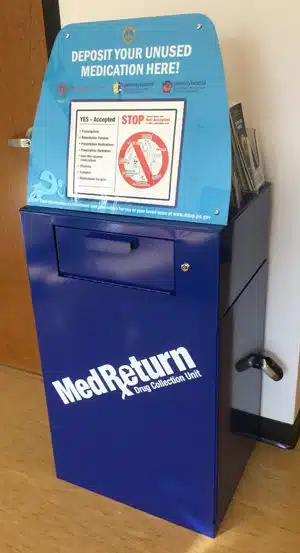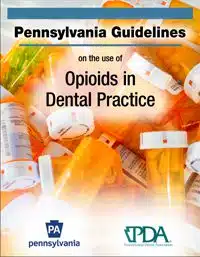Dentists are among the leading prescribers of opioid prescriptions. The opiate crisis, which takes lives, destroys families and increases crime, has significantly increased in recent years. New regulations and programs address this issue. Read Pi Dental Center’s blog about the Opiate Crisis and How It Relates To Dentistry.
A February 2017 panel discussion that included the Montgomery County Department of Drug and Alcohol, the Sheriff’s office, County Commissioner, Dr. Valerie Arkoosh, a Salvation Army representative, and survivors and advocates, was held to address the 138% increase in Montgomery County drug overdoses in 2016.
Research suggests that abuse of prescribed opioids can open the door to heroin use. Nearly half of young people who inject heroin surveyed in three recent studies reported abusing prescription opioids before they started heroin. Some individuals reported switching to heroin because it is less expensive and easier to obtain than prescription opioids. *
More people are dying from heroin overdose than in the past and authorities say that this is due to Fentanyl, which drug dealers often use to cut heroin. It is 80 to 100 times stronger than morphine.
Chief Deputy Michael Beaty, Montgomery County Sheriff’s Office, reported 237 drug related deaths in 2016 (213 were accidental and 98 involved Fentanyl). He asserted that drug use increases other crimes, such as theft.
Cocaine, methamphetamine, oxycodone and the prescription anti-anxiety medications alprazolam (Xanax) and clonazepam (Klonopin) contribute to overdose deaths.
Drug abuse is not only an urban problem. It occurs all locations, including suburban and, surprisingly, rural areas. A 2015 report from the Center for Rural Pennsylvania showed that overdose deaths from heroin, which sells for as little as $5 per bag on the streets, as well as prescription painkillers and other opioids have increased by 470% compared to the previous 20 years. More Pennsylvanians ages 20 to 44 are dying annually from overdoses than from motor vehicle accidents.
“Because of the uptick in cases, the treatment system is being severely taxed. Treatment centers, like Eagleville Hospital, need more beds.” said Kay McGowan, Montgomery County Deputy Administrator of Drug and Alcohol.
McGowan addressed the issue of relapse by recovering individuals. “So many people relapse when they are prescribed meds by a doctor.” Physicians and dentists must conduct careful screening to determine if the patient is in recovery. Alternatives, such as Nsaids, should be prescribed.
Benny Mosakowski lived in a tranquil suburban community where he attended Plymouth Whitemarsh High School and played football in the 1980’s. Prescription opioid medications had been prescribed for a football injury. Benny states that he became instantly hooked on the prescribed pills. He found that the pills were readily available to him but eventually switched to heroin. Benny never thought that heroin addiction could happen but his life quickly spiraled out of control. Mr. Mosakowski related, “I needed heroin as much as I needed air. I never learned to be an adult or developed coping skills. At 35, I’d had two marriages and 2 children and was sticking a needle in my arm every day.” It took Benny 10 years to stay clean. Thanks to Eagleville Hospital, as of 2012, he has not had another drug. “This is a disease and not a deficiency. I have seen more people die in the past 1 ½ years than in the previous 15. When you reach a state of willingness, if the help is there, you can quit. The problem starts in the medicine cabinet, but then heroin costs less than pills.” Today, Mr. Mosakowski is a survivor and advocate helping others.
The Journal of the American Medical Association reveals that dentists routinely prescribe opioid analgesics. The first sign of this unexpected source of opioid prescriptions was discovered in 2011. At that time a survey of members from the American Dental Association Survey Center was taken and the findings were surprising. The data shows the following:
- 85% of dental surgeons said they almost always prescribed an opioid
- 64% of surgeons said that their opioid prescription of choice was hydrocodone with acetaminophen
- The average number of hydrocodone with acetaminophen was 20 tablets
- In 96% of the cases, the only medical instructions provided for taking the pills was “as needed for pain”**
Gary Tuggle, who oversees the DEA’s Philadelphia Division, states, “It is imperative that law enforcement, healthcare and treatment professionals, elected officials, and community groups work together to address the factors impacting availability, use and abuse of these drugs.”
“There are many alternatives to opiates that are quite effective,” adds Valerie Arkoosh MD, Montgomery County Commissioner. “If a physician will not consider giving a non-narcotic medication, get a second opinion.” She emphasized, “Patients can just say no to opiates. Parents should always consider non-opiates.” Arkoosh also briefly discussed the new database that doctors and dentists must check before writing opioid prescriptions.
Many people believe that if pain relievers are prescribed by a doctor or dentist, then they are safe. However, if these medications are taken in larger amounts, more often than prescribed, or for unintended reasons, they can cause severe adverse effects including addiction, overdose, and death. Prescribed medications should never be taken by someone other than the one for whom they were prescribed. Opioid medications should never be combined with alcohol or other drugs.
In light of the current opiate epidemic, dentists must ask themselves how they can effectively help to reduce the problem. They must learn how to identify patients who have an addiction problem.
What should a dentist do if they suspect that one of their patients has an addiction problem?
New Pennsylvania Department of Health Prescription Drug Monitoring Program (PA PDMP) requirements took effect in January 2017. Dentists must check the PA PDMP database each time they prescribe an opioid medication.
Governor Wolf said, “By reducing the pattern of over-prescribing painkillers that have such a high risk for abuse, we are fighting back against opioid abuse and heroin use before those habits even begin.”
Providers have a responsibility to diagnose and treat pain using informed clinical judgement that minimizes serious adverse effects. Consideration for the patient’s past and current history of opioid use and abuse must be included when determining which pain medications should be prescribed. The patient’s substance use history should be documented.
Ask open-ended questions to learn about the patient’s drug use. It is as difficult as it is essential. Broaching the subject feels awkward and intrusive.
Unless contraindicated, non-steroidal anti-inflammatory medications (NSAIDS) should be considered. In many cases, NSAIDs have proven to be more effective in treating dental pain than opioids. Pain therapy can be initiated immediately prior to the surgical procedure and continued on a scheduled basis following completion of the procedure.
Patients reporting unexpectedly prolonged pain, particularly those who do not show evidence of ongoing pathology, should not be prescribed opioids. They can instead be referred to a chronic pain specialist.
Relevant information should be provided so patients are well informed about the various options available for pain management. Good physician/patient communication is essential.***
Patients whose behavior indicates the presence of a substance use disorder, should be encouraged to seek evaluation for treatment through their primary medical care provider.

Prosthodontist, Dr. Glenn Wolfinger states, “The staff of Pi Dental Center and I have been very aware of the issues regarding opioid use and have been very careful throughout the years in how these medications were prescribed. Non-steroidal anti-inflammatory pain medications have worked well for Pi Dental Center patients.”
In light of the severity of the opioid crisis, it is obligatory that dentists and physicians follow the new Pennsylvania guidelines to identify at-risk patients and to ensure patients are prescribed safe medications.
Contact Pi Dental Center for information about dental treatment and surgical procedures and pain medications.
Learn More about the opiate crisis and how it relates to dentistry:
Mapping Pennsylvania’s Worsening Heroin Crisis http://www.pennlive.com/news/2016/03/pennsylvanias_heroin_crisis_is.html
http://www.soberrecovery.com/recovery/how-dentists-are-contributing-to-the-opioid-epidemic/
http://sanctuary.net/prescription-drugs-lead-to-illegal-drug-use/


Good article Chris, the 138% figure of increased in Montgomery County drug overdoses in 2016 is very alarming. Drug addiction is a big problems in our society that needs to stops. Painkillers has huge Mental & Physiological Effects like constipation, Nausea, Vomiting, and so on.